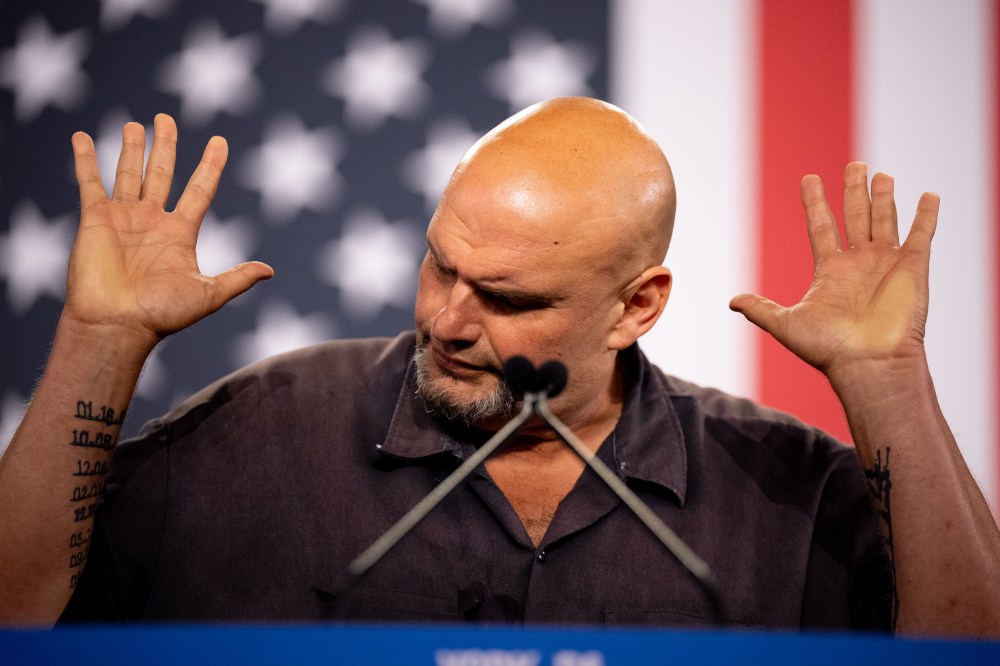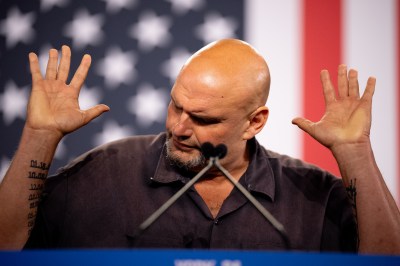If you’re looking for omens about how “political” the new pope might be, chew on this. On Monday, his fifth day on the job, Leo XIV celebrated … journalists.
He singled out those who have risked their lives by reporting from war zones or landed in prison after making trouble for tyrants, but some of his comments hit closer to home. “We do not need loud, forceful communication, but rather communication that is capable of listening and of gathering the voices of the weak who have no voice,” he warned, mentioning no one in particular, before going on to praise “the courage of those who defend dignity, justice, and the right of people to be informed, because only informed individuals can make free choices.”
In the context of modern American partisan politics, defending the media is tantamount to singing The Internationale. MAGA populists who spent last week spazzing out about a “woke Marxist pope” will treat Leo’s remarks as a QED. But what he said was noteworthy for another reason: This is a really awkward moment in the United States to start high-fiving the press for supposedly keeping people informed.
The splashiest news in politics this week is the new book by Jake Tapper and Alex Thompson revealing how physically and cognitively diminished Joe Biden became over the last few years. As far back as the 2020 campaign, they report, he was beginning to forget the names of longtime aides and allies. At a fundraiser last summer shortly before he dropped out, he failed to recognize actor George Clooney despite having known him for 15 years. There was allegedly chitchat among his staff as early as 2023 that he might require a wheelchair in his second term, a macabre echo of his aspirations to be a new FDR.
A lot of people in the know had a lot of concerns about Joe Biden. Yet those suspicions filtered into the press at no more than a trickle until the infamous presidential debate last year, after which Biden’s condition could no longer be denied. His performance that night was shocking—but it shouldn’t have been, and wouldn’t have been if America’s press truly respected “the right of people to be informed.”
In fairness, they didn’t disrespect it entirely. Weeks before the debate, the Wall Street Journal ran a scoop about how the president was showing signs of “slipping.” More than one poll published by the New York Times since 2022 revealed that Americans were growing alarmed about Biden’s fitness for office. The paper issued an editorial in February of last year, after the Hur report cast doubt on the president’s memory, demanding that Biden do more to prove that he was up for a second term.
But as late as six days before the debate, the Times was still running stories like this.
The punchline is that the press’s failure ultimately hurt Democrats, which isn’t how media bias usually works. Had reporters exposed Biden’s condition sooner, he might have been pressured out of the race early enough to allow for a competitive primary and a more popular successor as the nominee. Instead the press let his (and, in general, their) party sleepwalk into summer with a candidate at risk of imploding before the cameras at any second, potentially too late to be replaced by anyone except his underwhelming vice president. Which is precisely what happened.
There’s an obvious lesson in all that: When you see something, say something. The right of people to be informed about their leaders’ fitness to represent them requires nothing less. Fail in your duty to inform them and they’ll punish your party at the polls. And you’ll deserve it.
That is the lesson of the Biden fiasco, isn’t it?
A smear campaign?
Imagine you’re a Democrat who works in the Senate in some capacity and you sense something amiss in the behavior of a member that has you concerned. You’ve seen something. Do you say something?
Recently New York magazine published a long piece on Pennsylvania Sen. John Fetterman. A year ago Adam Jentleson, Fetterman’s former chief of staff, emailed one of the Walter Reed doctors who oversaw the senator’s treatment for clinical depression in 2023 to alert him of “concerns” about Fetterman’s behavior. The senator had stopped scheduling medical check-ups, Jentleson claimed, might be off his meds, and had become prone to “conspiratorial thinking” and “long, rambling, repetitive and self-centered monologues.” He had also bought a gun.
All of which makes him sound not so much mental as, well, Republican.
Some of the incidents alleged in the piece before Fetterman was hospitalized are genuinely hair-raising, like when he strolled across a road seemingly oblivious to oncoming traffic or went almost “catatonic” during a visit with then-colleague Sherrod Brown. But since he was released from Walter Reed two years ago, the signs of a mental-health problem have been more ambiguous—reckless driving, self-isolation, a persistent irascibility to those around him, according to current staffers.
If a senator being surly is evidence of mental illness, Amy Klobuchar should be in a straitjacket.
It’s concerning that those who work, and have worked, for Fetterman are worried about him. (Jentleson went as far as to say in last year’s email that he feared the senator “won’t be with us for much longer.”) Or at least it would be, if not for an important complicating factor in all this: John Fetterman’s public political “behavior” has also shifted dramatically over the last 18 months, as longtime readers of this newsletter know. Because it has, a right-wing counter-narrative about the senator’s condition has emerged in the aftermath of the New York piece. Democrats are smearing him, supposedly, because they resent the rightward turn he’s taken on everything from Israel to immigration to confirming Trump’s Cabinet nominees.
“Mr. Fetterman does indeed suffer from a debilitating illness: sudden onset political moderation,” Dispatch contributor James Kirchick declared on Monday for the Wall Street Journal. When Fetterman ran for Senate in 2022, visibly impaired from a stroke that he suffered during that year’s primary, “progressives castigated anyone who questioned Mr. Fetterman’s fitness for office as an ‘ableist.’ Now, when he’s clearly improved, they claim he’s unfit to serve,” Kirchick complained.
Fetterman has indeed become a top-tier hate object for progressives disgusted by his “betrayals,” which included a visit with Donald Trump at Mar-a-Lago shortly before the inauguration. Six senior staffers quit working for him to protest his support for Israel; he lost two more shortly before the New York piece was published, although the reasons in that case are unknown. A party capable of maintaining a years-long conspiracy of silence around the president should have little difficulty mounting an unfounded whisper campaign against John Fetterman to punish him for his ideological blasphemy.
I’m open to the possibility. But I’m open to the other possibility too—that, in the wake of the Biden catastrophe, Democrats are saying something because they’re seeing something.
Where there’s smoke …
Last week, citing two sources who had been “briefed,” the Associated Press published an account of a meeting Fetterman held with representatives of a Pennsylvania teachers union the day before the New York story came out.
“Before long, Fetterman began repeating himself, shouting and questioning why ‘everybody is mad at me,’ ‘why does everyone hate me, what did I ever do’ and slamming his hands on a desk,” the AP alleged. One of his staffers reportedly cut the meeting short, then cried in the hallway over his outburst while “rattled” union reps tried to comfort her. Hmmmm.
Forget anecdotes, though. Consider some data compiled by NBC News: From April of last year until March 2025, Fetterman missed more votes than any senator except J.D. Vance and Tim Scott, both of whom were involved in presidential campaigns. Since January, he’s missed 25 of 26 hearings and business meetings held by the Senate Commerce Committee, attending his first only after the New York article appeared, and has skipped the same types of gatherings this year of the Senate Homeland Security and Agriculture Committees.
And he only “rarely” holds political events like town hall meetings in Pennsylvania, although a spokesman told NBC that that should pick up during the summer recess.
Some of his colleagues in the Senate have begun to admit to reporters—on the condition of anonymity, of course—that they’re concerned. Two told The Hill this week that an intervention of sorts may be in the works:
“Every time I see him, I’m worried about him,” said a Democratic senator who requested anonymity.
…
“I know we’re all in touch with each other having conversations about how to intervene. I haven’t heard anybody say they’re not worried about it,” the senator said of the discussions among senators about how to help Fetterman.
…
“They’ve been more like, ‘We’re friends. What can we do as friends to provide some support?’” said [a second Democratic] senator, who expressed concern Fetterman appears to have become very isolated in Washington.
…
A third Democratic senator who requested anonymity reported witnessing Fetterman become emotional at work and expressed concern about his “well-being.”
Kirchick asserted in his op-ed that “what’s afflicting Mr. Fetterman is a more acute version of what struck Sens. Kyrsten Sinema and Joe Manchin, Democrats from red states who tried to reach across the political divide,” but that’s the proverbial dog that didn’t bark. As much as the left came to despise Manchin and Sinema for refusing to end the filibuster, neither was accused of being unfit to serve. Sinema in particular is a solid analogue to Fetterman, having campaigned for the Senate as a loud-and-proud progressive only to disappoint that cohort by steering sharply to the center upon taking office. If they’re lying about him, why didn’t they lie about her?
Leftists hate lots of Democrats in Congress, in fact. Not even Fetterman may be as anathema to them as Chuck Schumer, another pro-Israel liberal who spoiled their plans in March for a government shutdown to protest Trump’s policies. Yet Schumer, who’ll be 75 this year, has also been spared a whisper campaign about his mental health for some reason. Why?
“It’s because Fetterman was hospitalized once before for psychiatric issues, which makes him more vulnerable to that sort of smear,” you might say. Okay, but that cuts both ways: The fact that he’s been hospitalized before and may or may not still be taking his medication also makes it more plausible that there really is something amiss with his behavior.
So I ask again, what should a Democrat who works in the Senate do if they’re sincerely concerned about John Fetterman? If they say something, as Jentleson did, they’re accused of maligning a good man whose only “illness” is supporting Israel’s right to exist. If they don’t say something and, God forbid, something happens to the senator, they’ll be accused of cynically letting a fragile Democrat make a spectacle of himself to the detriment of his own health, just like they did with Joe Biden.
If you see something, say something? Or say nothing? Do we wish there’d been a New York magazine report circa late 2022 about the then-president forgetting people’s names or don’t we?
The new filibuster.
Jonathan Chait beat me to the punch a few days ago on the ultimate point here. If it’s true that the left is more willing to question Fetterman’s mental fitness because of his political positions, and I think it is, it’s equally true that the right is more willing to defend him for the same selfish reasons.
If Jentleson’s email had been published by the Wall Street Journal instead of New York magazine, and if Fetterman had pivoted hard to the Bernie/AOC left instead of to the center over the past 18 months, the partisan complexion to this episode would have flipped on its head. Republicans would salute Jentleson as a whistleblower who showed compassion for a boss whose brain was clearly damaged. Progressives would impugn him as a neoliberal shill intent on demonizing the senator for his righteous anti-Israel stance.
As it is, Fetterman’s well-being is like one of those drawings that resembles a duck or a rabbit depending on the viewer. Is it a story about a leftist whisper campaign? Or is it a story about the right committing the very sin Democrats committed last year by turning a blind eye to the condition of an official in whom they’re politically invested?
Partisan politics overflows with cynicism and hypocrisy but there’s something distinctly obnoxious about treating a troubled man’s mental health as a Rorschach test for whether you find his policy preferences “crazy” or not. It reminds me of Democrats’ nihilistic approach to the filibuster, clamoring for its elimination the moment they gain a Senate majority and clamoring for its survival the moment they lose it. It’s one of their Trumpiest political impulses: There’s not a lick of civic principle to it, only self-interest in its rawest form.
So too with Fetterman’s health for those observing all of this from afar. If you like his rightward turn, he’s fine. Better than fine! If you don’t, he’s a disaster waiting to happen. Where you stand is where you sit.
I suppose we’ll find out which side is right in the fullness of time. Cross your fingers.
After the calamity of Joe Biden’s campaign, I tend toward assuming that where there’s smoke about a politician’s health there’s probably also fire. One would think that the outcome of that campaign might convince both sides to do the same, as Chait is also certainly correct that parties benefit from casting an unforgiving eye on the health troubles of their leaders. Had Democrats erred on the side of assuming that Biden’s public difficulties weren’t “cheap fakes,” they might have forced him out sooner and retained the presidency. Republicans would profit by learning from that mistake.
But they won’t.
Already there are small reminders of Donald Trump’s advanced age creeping into his public appearances—a mysterious bruise here, a bout with drowsiness there. But even more so than with Biden, a taboo against admitting that he’s in decline as he enters his 80s will be ruthlessly enforced by his party. The president and his supporters are wholly committed to his image as a pillar of “strength,” including with respect to his physical health. He’s gone to freakish lengths in the past to suppress material that might hold evidence to the contrary, even refusing to explain the nature of hospital visits that turned out to have mundane causes.
And although he’s supposed to be term-limited, one never knows how stupid and lawless American politics might get. He won’t tolerate members of his party observing that he’s “lost a step,” just in case four more years are somehow on the table after all.
Have no doubt, if and when he does begin to slow down, that most of the right-wing media critics savaging the press this week for failing to expose Biden’s decline will have little to say about their own side’s failure to expose Trump’s. That’s par for the course in an industry in which each new failure of the New York Times re-proves the case that the mainstream press is irretrievably broken, yet the utter, relentless whoredom of populist media for dimwitted authoritarian propaganda reliably passes without comment.
In deciding which side is probably correct about John Fetterman, we should bear in mind whether big media or its Trumpist alternative does more on balance to protect “the right of people to be informed.” I suspect our new American pope has a firm opinion about that, and I suspect he’s right.







Please note that we at The Dispatch hold ourselves, our work, and our commenters to a higher standard than other places on the internet. We welcome comments that foster genuine debate or discussion—including comments critical of us or our work—but responses that include ad hominem attacks on fellow Dispatch members or are intended to stoke fear and anger may be moderated.
With your membership, you only have the ability to comment on The Morning Dispatch articles. Consider upgrading to join the conversation everywhere.